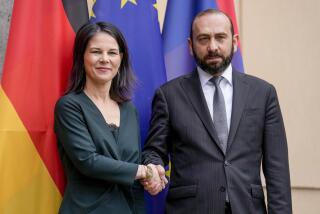German lawmakers OK new Greek bailout talks; Europeans approve fresh loan
German lawmakers fell in line behind Chancellor Angela Merkel on Friday and gave the go-ahead to bailout talks with Greece, despite deep hostility among many to lending more money to a country they say does not deserve it.
Approval by Berlin, the preeminent power in the Eurozone, is indispensable to organizing an expected $94-billion rescue package for Athens in exchange for a punishing regimen of further austerity and tax hikes. The 439-119 vote in the Bundestag to authorize bailout negotiations capped hours of debate during which one lawmaker likened Greece to a bottomless pit while others warned of Germany’s increasingly negative image abroad as the heartless taskmaster of Europe.
“I know that many have doubts and concerns about whether this road will be successful, about whether Greece will have the strength to take it in the long term,” Merkel said. “But I am firmly convinced of one thing: We would be grossly negligent, even irresponsible, if we did not at least try this road.”
She noted that a new bailout package – Greece’s third in five years – would entail strict outside oversight to ensure Athens stuck to its pledges of fiscal and economic reform.
Those pledges encompass everything from allowing Sunday trading to overhauling the labor market to selling off billions of dollars’ worth of state-owned assets. Draconian budget cuts – on top of several previous rounds of austerity – are also part of a pre-bailout agreement Merkel and other European leaders reached with Athens this week.
The Greek government acquiesced to the tough conditions in the face of a disastrous alternative: a chaotic default and the ejection of Greece from the Eurozone, the club of 19 nations that use the euro currency.
Some relief for Greece came through with the approval Friday by European authorities of a nearly $8-billion “bridge loan” for Athens to meet its immediate funding needs.
Drawn from a European fund for financial emergencies, the money will enable Athens to make a large debt payment due to the European Central Bank on Monday as well as make good on two missed payments to the International Monetary Fund. Defaulting on the central bank debt could have triggered the failure of Greece’s banks and an exit from the euro.
The loan, to be disbursed in two installments, is good for three months, by which time the hope is that a new bailout package for Athens will have been worked out and put in place.
The harsh terms of the deal to rescue the Greeks, which mostly derived from a German blueprint, sparked accusations that Berlin either sought to humiliate Greece or impose such intolerable conditions for a bailout that Athens would choose to exit the euro. Both during and after the negotiations, German Finance Minister Wolfgang Schaeuble raised the idea of a “timeout” from the euro as a preferable option for Greece.
That tough line plays well in Germany, and Merkel praised Schaeuble for his leadership during Friday’s Bundestag debate.
But she also adopted a more emollient tone, saying that a Greek departure from the euro would have been undertaken only with the assent of other Eurozone partners and of Greece itself, in order to manage the process as smoothly as possible. Otherwise, the result would have been “predictable chaos,” said Merkel.
For his part, Schaeuble said in a lectern-thumping speech that he was committed to maintaining the integrity of the Eurozone and to making one “last attempt” at resolving the Greek debt crisis.
With the coalition government’s commanding majority in the Bundestag, the outcome of the vote was never in doubt. But as many as 50 lawmakers in Merkel’s bloc voted no, up from the number who dissented in a previous bailout-related vote earlier this year. There were 40 abstentions.
Austria, another Eurozone nation that has expressed reservations about another rescue package for Greece, also approved the launch of bailout negotiations Friday, the Associated Press reported.
In Athens, Prime Minister Alexis Tsipras reshuffled his Cabinet on Friday after dealing with a rank-and-file rebellion of his own. He sacked ministers from the hard-left faction of his Syriza party who voted against economic reforms passed by the Parliament on Thursday to pave the way for bailout talks.
Members of the faction had denounced the new measures as a betrayal of the party’s principles, though their leader pledged to continue supporting a Syriza-led government. The Cabinet reshuffle brought in some new faces but preserved the same ruling coalition of Syriza and the right-wing Independent Greeks party.
Increased political uncertainty could compromise Tsipras’ ability to implement those reforms. Some are due to go into effect as early as Monday, including a rise in sales tax for some goods and services.
Follow @HenryHChu on Twitter for news out of Europe
More to Read
Start your day right
Sign up for Essential California for news, features and recommendations from the L.A. Times and beyond in your inbox six days a week.
You may occasionally receive promotional content from the Los Angeles Times.







